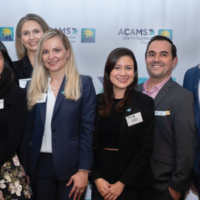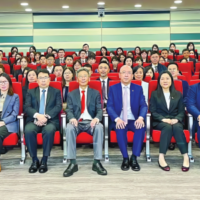
On November 28, 2017, a seminar on the EU’s Fourth AML Directive (4AMLD) was hosted by the ACAMS Netherlands Chapter and organized in partnership with KPMG.
With Maud Bökkerink (former DNB supervisor integrity) as the first speaker followed by Leen Groen and Evelyn Bell from KPMG, the seminar was guaranteed to have an interesting combination of points of views with regard to the 4AMLD implementation.
Here are some of the highlights and key takeaways of the event.
4AMLD—Revision of the WWFT
Bökkerink started her presentation with a short explanation about the status of the implementation and the ultimate beneficial ownership (UBO) register. Just over half of the EU countries have indicated that they have implemented the directive. The implementation of the UBO register and related legislation has been a struggle for many EU countries and only Germany, the U.K. and Denmark have met the implementation deadline.
During the second part of her presentation, Bökkerink tried to answer the question, “How risk-based is the proposed Money Laundering and Terrorist Financing (Prevention) Act (WWFT)?” If you would search the WWFT for references to “risk-based,” the number of hits would be very limited. Instead, the new draft law refers many times to “reasonable measures.” The reason for using this term instead of “risk-based” is explained by Bökkerink in combination with an explanation of what “reasonable measures” actually are according to the law.
Risk-based, adequate measures were focused (with respect to the UBO) on those cases with a higher money laundering/terrorist financing (ML/TF) risk and the 4AMLD no longer allows for this interpretation. Reasonable measures are measures that are proportionate to the nature and size of the entity. The intensity of the measures can be commensurate to the specific ML/TF risks of a client or transaction.
After explaining some of the basic requirements for carrying out a risk assessment, the audience raised questions about the optimal frequency for carrying out a risk assessment or Systematic Integrity Risk Analysis (SIRA). According to Bökkerink, it is important to at least update your risk assessment when relevant laws and regulations are updated.
During the final part of the presentation, Bökkerink covered the pseudo-UBO and the challenges around this new requirement and she finished her presentation with a short update on changes in supervisory measures.
Recent Cases and Expectations of 5AMLD
With some basic but impressive numbers about the Paradise Papers, Groen from KPMG kicked off the second presentation of the day.
The question, “Did you already conduct a review to determine whether your customers/business relationships appear in the International Consortium of Investigative Journalists database?” made the audience quiet for a moment although some of the participants did run some queries.
According to Groen, the impact of the Paradise Papers is expected to be greater than the impact of the Panama Papers.
Some key findings include:
- Offshore activities of politicians and world leaders
- Aggressive tax planning of multinationals
- Secretive deals and hidden companies
- Royals and sport stars avoiding taxes
Groen also explained the basics of the setup of the Azerbaijani Laundromat including a short summary of how they did it. Most transactions were originated by companies related to the family of the president/Azerbaijan regime and 33 companies involved in the Russian Laundromat were also involved in this laundromat.
4AMLD in Relation to the Azerbaijani Laundromat
The second part of Groen’s presentation made a clear connection between these schemes and the 4AMLD whereby many of the requirements in the 4AMLD (such as SIRA, enhanced due diligence, transaction monitoring, politically exposed persons and others) were covered to explain how they could have (partially) prevented these schemes from occurring or at least from becoming so large.
The final speaker Evelyn Bell used a clear roadmap for Fifth AML Directive (5AMLD) to explain how this draft law was influenced by some of the schemes that occurred in previous years and to explain the current status of the law.
In addition, she explained some upcoming changes that the 5AMLD will bring with regard to virtual currencies, prepaid cards, cooperation and information sharing between financial intelligence units and high-risk countries, and improved access to beneficial owner information.
Panel Discussion
The seminar ended with a short panel discussion where Arnaud Romme from ING participated along with the speakers. The challenges around dealing with virtual currencies with limited guidance from regulators was covered intensively during the panel discussion.
The ACAMS Netherlands Chapter is grateful to the speakers, the sponsor KPMG and participants for a highly informative seminar.
Board of the ACAMS Netherlands Chapter










